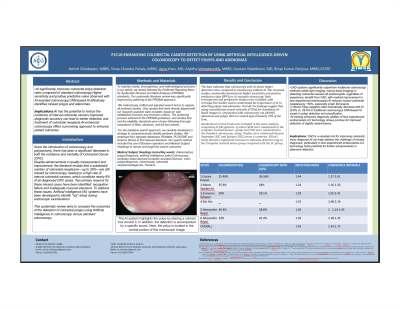Monday Poster Session
Category: Colorectal Cancer Prevention
P2110 - Enhancing Colorectal Cancer Detection by Using Artificial Intelligence-Driven Colonoscopy to Detect Polyp and Adenoma Rates
Monday, October 28, 2024
10:30 AM - 4:00 PM ET
Location: Exhibit Hall E

Has Audio

Ashish Chilakapati, MBBS
GIMSR Medical College
Pensacola, FL
Presenting Author(s)
Ashish Chilakapati, MBBS1, Vinay chandra Pokala, MBBS2, Safiyyah M. Khan, MBBS3, Aqsa Khan, MD4, Arpitha Venkatareddy, MBBS5, Gautam Maddineni, MD6, Binay K. Panjiyar, MBBS7
1GIMSR Medical College, Pensacola, FL; 2Apollo Hospital, Hyderabad, Telangana, India; 3Bangalore Medical College, Bangalore, Karnataka, India; 4Parkview Health Center, Fort Wayne, IN; 5Daily Rounds, Chintamani, Karnataka, India; 6Florida State University, Cape Coral, FL; 7Harvard Medical School, Boston, MA
Introduction: Since the introduction of colonoscopy and polypectomy, there has been a significant decrease in both the incidence and mortality of Colorectal Cancer (CRC). Despite advancements in quality measurement and improvement, the literature reveals that a substantial number of colorectal neoplasms—up to 26%—are still missed by colonoscopists, leading to a high rate of interval colorectal cancers, which constitute nearly 9% of all diagnosed CRC cases. Two primary reasons for these missed cases have been identified: recognition failure and inadequate mucosal exposure. To address these issues, Artificial Intelligence (AI) systems have been developed to identify “hot” areas during endoscopic examinations. This systematic review aims to compare the outcomes of the detection of colorectal polyps using Artificial Intelligence in colonoscopy versus standard colonoscopy.
Methods: We conducted a search of the PUBMED, SCIENCE DIRECT, and PLOSONE databases for systematic reviews up to March 2023, focusing on the diagnostic accuracy of AI in detecting colorectal polyps and adenomas. The study included systematic reviews and randomized controlled trials (RCTs) from these databases. The primary outcome measured was the colorectal polyp detection rate. Secondary outcomes included adenoma per colonoscopy (APC) according to size, morphology, and location; advanced APC; polyp detection rate; polyps per colonoscopy; and sessile serrated lesions per colonoscopy. We calculated detection rates (DRs), performed subgroup and sensitivity analyses, and assessed heterogeneity and publication bias.
Results: The data indicates that colonoscopy with AI shows higher detection rates compared to colonoscopy without AI. The reviewed studies consistently demonstrate higher sensitivity and positive predictive value (PPV) for AI-assisted colonoscopy. Both retrospective and prospective studies were included, with retrospective studies used to understand the importance of AI in detecting polyps and adenomas. Overall, the findings suggest that using convolutional neural networks (CNNs) for classifying AI-based images in conjunction with colonoscopy can identify adenomas and polyps that are missed approximately 25% of the time.
Discussion: The integration of Artificial intelligence with colonoscopy significantly enhances the detection of colorectal polyps compared to using the standard colonoscopy.
Thus, AI addresses in reducing the incidence of missed colorectal neoplasms.
Note: The table for this abstract can be viewed in the ePoster Gallery section of the ACG 2024 ePoster Site or in The American Journal of Gastroenterology's abstract supplement issue, both of which will be available starting October 27, 2024.
Disclosures:
Ashish Chilakapati, MBBS1, Vinay chandra Pokala, MBBS2, Safiyyah M. Khan, MBBS3, Aqsa Khan, MD4, Arpitha Venkatareddy, MBBS5, Gautam Maddineni, MD6, Binay K. Panjiyar, MBBS7. P2110 - Enhancing Colorectal Cancer Detection by Using Artificial Intelligence-Driven Colonoscopy to Detect Polyp and Adenoma Rates, ACG 2024 Annual Scientific Meeting Abstracts. Philadelphia, PA: American College of Gastroenterology.
1GIMSR Medical College, Pensacola, FL; 2Apollo Hospital, Hyderabad, Telangana, India; 3Bangalore Medical College, Bangalore, Karnataka, India; 4Parkview Health Center, Fort Wayne, IN; 5Daily Rounds, Chintamani, Karnataka, India; 6Florida State University, Cape Coral, FL; 7Harvard Medical School, Boston, MA
Introduction: Since the introduction of colonoscopy and polypectomy, there has been a significant decrease in both the incidence and mortality of Colorectal Cancer (CRC). Despite advancements in quality measurement and improvement, the literature reveals that a substantial number of colorectal neoplasms—up to 26%—are still missed by colonoscopists, leading to a high rate of interval colorectal cancers, which constitute nearly 9% of all diagnosed CRC cases. Two primary reasons for these missed cases have been identified: recognition failure and inadequate mucosal exposure. To address these issues, Artificial Intelligence (AI) systems have been developed to identify “hot” areas during endoscopic examinations. This systematic review aims to compare the outcomes of the detection of colorectal polyps using Artificial Intelligence in colonoscopy versus standard colonoscopy.
Methods: We conducted a search of the PUBMED, SCIENCE DIRECT, and PLOSONE databases for systematic reviews up to March 2023, focusing on the diagnostic accuracy of AI in detecting colorectal polyps and adenomas. The study included systematic reviews and randomized controlled trials (RCTs) from these databases. The primary outcome measured was the colorectal polyp detection rate. Secondary outcomes included adenoma per colonoscopy (APC) according to size, morphology, and location; advanced APC; polyp detection rate; polyps per colonoscopy; and sessile serrated lesions per colonoscopy. We calculated detection rates (DRs), performed subgroup and sensitivity analyses, and assessed heterogeneity and publication bias.
Results: The data indicates that colonoscopy with AI shows higher detection rates compared to colonoscopy without AI. The reviewed studies consistently demonstrate higher sensitivity and positive predictive value (PPV) for AI-assisted colonoscopy. Both retrospective and prospective studies were included, with retrospective studies used to understand the importance of AI in detecting polyps and adenomas. Overall, the findings suggest that using convolutional neural networks (CNNs) for classifying AI-based images in conjunction with colonoscopy can identify adenomas and polyps that are missed approximately 25% of the time.
Discussion: The integration of Artificial intelligence with colonoscopy significantly enhances the detection of colorectal polyps compared to using the standard colonoscopy.
Thus, AI addresses in reducing the incidence of missed colorectal neoplasms.
Note: The table for this abstract can be viewed in the ePoster Gallery section of the ACG 2024 ePoster Site or in The American Journal of Gastroenterology's abstract supplement issue, both of which will be available starting October 27, 2024.
Disclosures:
Ashish Chilakapati indicated no relevant financial relationships.
Vinay chandra Pokala indicated no relevant financial relationships.
Safiyyah Khan indicated no relevant financial relationships.
Aqsa Khan indicated no relevant financial relationships.
Arpitha Venkatareddy indicated no relevant financial relationships.
Gautam Maddineni indicated no relevant financial relationships.
Binay Panjiyar indicated no relevant financial relationships.
Ashish Chilakapati, MBBS1, Vinay chandra Pokala, MBBS2, Safiyyah M. Khan, MBBS3, Aqsa Khan, MD4, Arpitha Venkatareddy, MBBS5, Gautam Maddineni, MD6, Binay K. Panjiyar, MBBS7. P2110 - Enhancing Colorectal Cancer Detection by Using Artificial Intelligence-Driven Colonoscopy to Detect Polyp and Adenoma Rates, ACG 2024 Annual Scientific Meeting Abstracts. Philadelphia, PA: American College of Gastroenterology.
